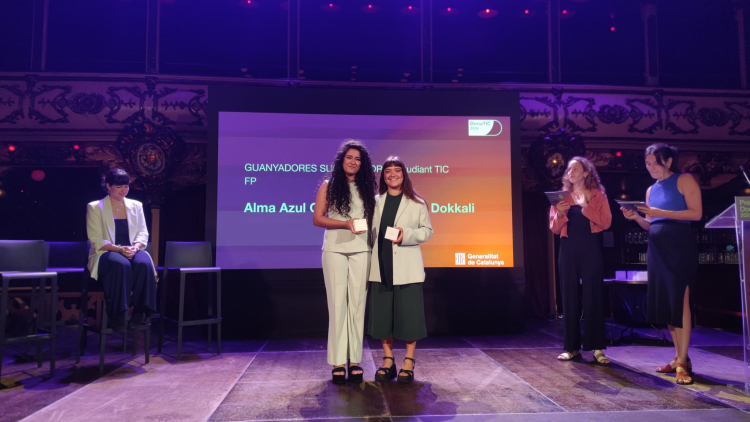In the framework of the International Day for the Elimination of Violence against Women, a key day to show rejection of the violence suffered by girls, adolescents, young people and women around the world and to express the need to address them and to give a clear, direct and effective response with the aim of eradicating them completely, we interview Alma Azul Colina and Amani Fadli Dokkali. Both women were awarded in the last edition of the DonaTIC Awards, organized by the Secretariat of Digital Policies of the Generalitat of Catalonia, in the ICT Student Professional Training category. Discover them!
1. What is your background in the IT world?
Alma and Amani: We recently completed the Higher Degree in Multi-Platform Application Development focused on digital entertainment and video games. In this sense, throughout our studies, we have always approached our projects with a gender perspective, as it is a key issue for us that runs through us every day. Specifically, within the cycle, we have developed different innovative projects, such as, for example, the 'DalIA App' project, with which we were awarded the DonaTIC Award, and the 'Hollywood Nightmare' project.
2. For you, what does receiving a DonaTIC Award mean?
Amani: For us, receiving the DonaTIC Award is a matter of pride, as the recognition represents a reward for effort and work. Also, the award means a great push that allows us to continue getting involved in the technological field with more security and with less fear, as well as reaffirms our commitment to continue working knowing that there is a firm and imminent possibility of being part of this sector.
Alma: Personally, I was very inspired to see that there is a support network, which arises as a result of the DonaTIC Awards. For me, the award means a great sense of identity, since I recognize myself as a woman in a key sector such as the technology sector. In addition, it gives meaning to all the work we have developed over these years in the Higher Degree and gives wings to all the future proposals and initiatives we are working on.
3. How important are references for other girls who want to work in ICT?
Amani: Female role models are essential so that girls are not afraid to enter this technological world, which is not only for 'geeks' and where they can find a lot of diversity and can end up finding their place.
Alma: Within the technological field, reference women are vitally important for boys and girls, as they allow them to imagine a future that includes them, a future of which they can be a part. Currently, technology permeates our society deeply and I believe that it must be thought of by a heterogeneous group of people in order to build a more inclusive world. I think that, for girls, it can be a challenge that the studios are mostly made up of boys, but I think that you should not be afraid and look for alliances with other girls.
4. And you, what references did you have?
Amani: I could say that the women in my family have always excelled in a 'man's world'. My mother was a welder and my sister is an aerospace engineer and currently works within the world of Formula 1.
Alma: Although I haven't had direct and concrete female role models within the technology sector, I share with my colleague, Amani, that my mother and grandmother have always inspired me and still inspire me a lot. In addition, my colleagues in the Higher Degree have helped me a lot and I have felt them as references at many times. Seeing that they could do it and achieve it made me believe that I too could overcome challenges with success and determination.
5. Finally, can you tell us about your project to prevent sexist violence?
Alma and Amani: Gender violence in the digital sphere is a problem that grows day by day and that calls for innovative solutions. Called 'DalIA App', the project consists of an artificial intelligence tool designed to detect patterns of verbal violence in social media conversations. The solution aims to address the difficulty of identifying gender-based violence in digital environments and contribute to Sustainable Development Goals 3, 4, 5, 9 and 10, which are related to health, education or gender equality genre
So, it is a tool based on artificial intelligence capable of reading and recognizing patterns of verbal violence in digital conversations. Through studies and analyzes of behavior based on specific conversations, the application will be able to identify violent or aggressive behavior. The idea will be to develop a mobile application that implements this artificial intelligence using a library of common words and phrases. This approach will make it possible to offer an innovative solution to address this problem from a technological and inclusive perspective. To use the app, you will need to download the conversation and the tool will analyze the dialogue word by word and as a result, give a resolution of abusive attitudes. Also, to carry out a pedagogical and reflective task, the application will have a section where users can test themselves and detect moments where their attitude is aggressive or violent when communicating on digital channels.



